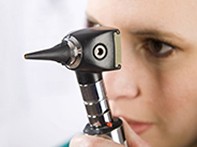Peer Reviewed
Feature Article Ear, nose and throat medicine
The essentials of managing hearing loss
Abstract
Hearing loss is a common condition that can have a great impact on a patient’s quality of life. Hearing aids are an effective treatment for those with mild-to-moderate hearing loss and surgical options may be available for those with more severe loss.
Key Points
- Hearing loss is very common in the community. Mild-to-moderate hearing loss affects one in five adults by the age of 50 years.
- Moderate-to-severe hearing loss has a measurable impact on quality of life, employability and, in the elderly, independent living and cognitive decline.
- Hearing loss is best classified as conductive, sensory neural or mixed. This simple classification guides the clinical evaluation, range of available treatments and response to treatment.
- History, otoscopy and tuning fork tests allow most causes of hearing loss to be diagnosed, allowing a management plan to be formulated.
- Surgical treatment for conductive hearing loss is generally successful. Cochlear implants are the treatment of choice for severe sensory neural hearing loss.
Picture credit: © Rich Legg/iStockphoto.
Purchase the PDF version of this article
Already a subscriber? Login here.

